
The Life and Times of Hubert Brooks M.C. C.D.
A Canadian Hero

 |
|
 |
After the Olympic win, the Flyers stayed in Europe several more weeks and played 35 exhibition games to raise enough money to pay for the trip and expenses to date.
The SUMMARY LIST below highlights the principle games played and the outcomes. In addition, when demand warranted, we played a number of inter–team ‘red’ vs ‘blue’ exhibition games – which pleased Sandy Watson to no end, as we got to keep most of the gate receipts!
| Date | Score | Location of Hockey Game (CLICK Link for futher details) |
|---|---|---|
| Feb 10 | 18–4 | EHC Arosa Arosa, Graub�nden, Switzerland |
| Feb 12 | 9–6 | Zurich, Switzerland After game win, Flyers played a 5 minute exhibition game amongst themselves. |
| Feb 14 | 12–3 | Lausanne Mont Choisi, Switzerland |
| Feb 15 | 5–2 | Berne, Switzerland |
| Feb 17 | 5–2 | Czech Olympic Team Prague, Czechoslovakia |
| Feb 19 | 3–3 | Czech Olympic Team Prague, Czechoslovakia AND PRAVO LIDU |
| Feb 20 | 9–3 | Moravia @ Brno, Czechoslovakia (Brno is the capital of Moravia) AND Moravia NewsPaper |
| Feb 21 | 4–3 | RCAF Red vs Blue game @ Brno, Czechoslovakia (Team paid $1400 for game.) AND Moravia NewsPaper |
| Feb 22 | 3–2 | Regional Slovakian Team, @ Bratislava, Czechoslovakia |
| Feb 23 | 7–6 | RCAF Red vs Blue game @ Ostrava, Czechoslovakia (Team paid 4,000 koruns for game.) |
| Feb 24 | 2–1 | 2nd Best Team in Czech @ Ostrava, Czechoslovakia |
| Feb 25 | 7–2 | Czech Air Force @ Budejovice Czechoslovakia (Team paid $1200 for game.) |
| Feb 26 | 3–3 | Bohemia @ Prague, Czechoslovakia |
| Feb 28 | 8–4 | Czechoslovakia @ Paris (Coupe Jean Potin Tournament) |
| Mar 3 | 1–2 | Scotland All Stars @ Paris (Coupe Jean Potin Tournament) |
| Mar 6 | 5–3 | Paris Racing Club @ Paris (Coupe Jean Potin Tournament) |
| Mar 7 | 9–1 | Dutch & Canadians @ The Hague, Holland |
| Mar 10 | 4–0 | AIK Club @ Stockholm, Sweden |
| Mar 11 | 8–0 | Soertalje @ Stockholm, Sweden |
| Mar 12 | 3–2 | Swedish National @ Stockholm, Sweden |
| Mar 14 | 5–5 | Dundee Tigers (Scotland) @ Stockholm, Sweden |
| Mar 16 | 3–0 | Hammerby @ Stockholm, Sweden |
| Mar 18 | 3–5 | Wembley All Stars, Great Britain |
| Mar 20 | 4–2 | Streatham Greater London, Great Britain |
| Mar 22 | 5–5 | Dundee Tigers Dundee, Scotland |
| Mar 23 | 7–1 | Scotish All Stars @ Perth, Scotland |
| Mar 24 | 8–2 | Ayr Raiders Ayr, Scotland |
| Mar 26 | 4–1 | Dumferline Vikings Dumferline, Scotland |
| Mar 28 | 5–6 | Fife Flyers Fife, Scotland |
| Mar 29 | 8–3 | Falkirk Lions Falkirk, Scotland |
It was a welcome change. The pre–Olympic bad press had vanished overnight. We had become the darlings of the
European sporting community. Our tour of European cities to play a series of exhibition games was a roaring success.
"We were treated like conquering heroes by the fans,"
said Ab Renaud.
"The largest crowds we ever had back home might be a few thousand. In Paris, against the Paris Racing Club, the best team in Europe,
19,000 people showed up. But it was a grueling tour."
At most of the stops we were wined and dined and presented with gifts, civic holidays were declared, and school children came to railway stations
seeking autographs.
As in the pre–Olympic games, we all got a chance to play in the post–Olympic games. There were no 11+1 player limitations.
The team left St. Moritz at 3:15PM on February 9th shortly after the reception for my wedding. I stayed behind with Bea for a short honeymoon. The train reached Chur about 6PM, where a train change occured and then proceeded on to the Volsana Hotel in Arosa later that evening.
After the Olympics, we had four games in a row in Switzerland – each before a crowd of anywhere between 5,000 and 10,000 fans. We were able to win all four – we were on a roll – although the four goals scored against Dowey at Arosa were more goals against than any previous game to date.
February 10, 1948 EHC Arosa at Arosa, Graubunden, Switzerland
|
|
|

|

|
For further details on a specific post Olympic game in Switzerland, please double click on the hyper link found in the Summary Flyer Game List above and a relevant news article on the game will appear in a new window.
|
|
One of the memories that the Flyers would remember and talk about back in Canada, was the "party-to-end-all-parties" thrown in their honor by Captain Arnie Charbonneau MC (of the Canadian Army who was on exchange tour of duty in Switzerland and who was one of the team's strongest rooters during the Olympics in St. Moritz) in Arosa - the location of the Flyer's first hockey game after the Olympics.

After our last game in Switzerland on the 15th February, and the reception hosted by Air Vice Marshall McBurney held in our honor at the Berne Canadian Legation,
Wally Halder and George Mara – the only
two civilians on the team – left to go back to Canada to their respective businesses for which they both had responsible positions (and also help their Toronto based hockey team the Barker's Biscuits).
They were a little tired of the grind as well and frankly were both independently wealthy compared to the rest of us.
The boys arrived home on March 4th
and
Halder and Mara provided the press with some comments about their experience in Europe.
Coach Boucher was not pleased and held a grudge for many years to come for, what he considered to be, a desertion by his two star players.
Following their departure, Coach Boucher laced up his skates, and played with the team in their matches – to some acclaim I might add.
Murray Dowey left us after the Scottish All Star game in Paris (see section 11.1.4 below) on Thursday March 4, 1948– heading home to Canada first week of March as he had commited to his Toronto based hockey team the Barker's Biscuits that he'd be gone no more than 2 months. Murray was also concerned about not compromising his job at the Toronto Transit Commission.
Patsy Guzzo also wanted to go home. He'd asked right after the Olympics and felt he'd been given a pseudo promise he could leave by February 19th. Now, because of the departure of the others, and his obvious skills, he was ordered to stay. Apparently there had been a fire in his kitchen at home and he was worried about his family. He was a very passionate person of Italian heritage with very strong emotions. He was quite moody for the longest time after being ordered to stay with the team.
Next was Czechoslovakia. We had 6 games scheduled here. Prague was still dark and desolate from World War II. Food rationing was in effect.
Nevertheless, the Czechs more than made up from the overhanging gloom with their love for hockey.
We were met by crowds and memento gifts almost
everywhere we went. School children were given holidays to see us. Almost every town we visited gave us a civic reception or banquet and loaded us with presents - pencils, ash trays, and other things from the local factories; medals, cut glass vases with Canada cut into them,
scarves embroidered with the words Canada, metal cups engraved with a Maple Leaf design. In one small mining town we were given a miniature miner's lamp as a souvenir.
During our stay in Czechoslovakia, Leo Dousa, a Czechoslovakian and a representative of the American Hockey Association was exceedingly helpful -- especially in organizing additional exhibition games for us - and stayed with us for our tour of the country. Leo was not to pleased with the American team, who were mostly college grads, and paid little attention to him.
For further details on a specific game, please double click on the hyper link found in the Summary Flyer Game List above and a relevant news article on the game will appear in a new window.
Our first game in Czechoslovakia was in Prague on Feb 17th against the Czechoslovak Olympic team in the Winter Stadium. More than 12,000 fans watcher us win 5-2. With the departure of Mara and Halder, Frank Boucher had inserted himself back into the lineup and starred for the team.
In Prague on February 17th immediately after the game, the Vice President of the International Ice Hockey Federation presented Sandy Watson with the World Championship trophy which had been won by the Czech's the previous year. Each of the players was also presented with a cut glass vase.
|
|
After the presentation we returned to our hotel, the Hotel Opera, and filled the trophy with champagne. The team from England was also there and joined in the celebration. That evening we were invited to the Masquerade Ball at the Luzerna -
returning back to the Hotel Opera at 1AM in the morning.
The next morning on the 18th at 11AM we were greeted by the mayor at City Hall and presented with a booklet on Prague, a city of about 1 million.
At 5PM that evening we attended a reception at the Canadian Embassy hosted by Mr. MacDonnell the Charge d'Affaire.
In Budĕjovice (largest city in the South Bohemian Region) the every attentive Czech craftsmen fashioned a
red metal cup for each of us, with CANADA and our name inscribed (in gold–like paint) on the cup and (their rendition) of our likeness
(taken from a team photo) in full hockey garb. (One cup was enscribed with the name "Back Row" ! ) Also imprinted on the cup was Č.S.R. (Czecho Slovak Republic) the date 25. II. 1948 and the
(České) C. Budĕjovice Stadion. Perhaps interestingly, of all the gifts and mementos from this road trip – this is the one
I still have after a number of years. (Its amazing how much the personal touch matters over store bought mementos!)

|

|
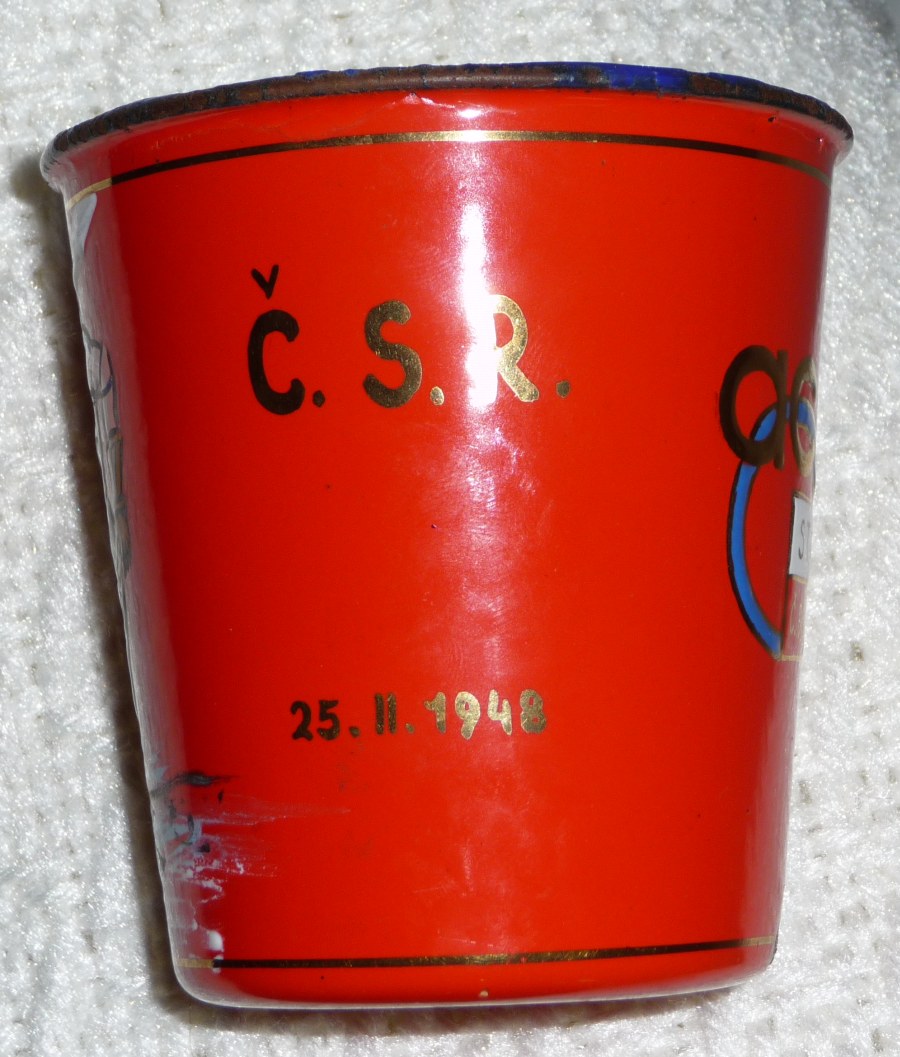
|
Mid way through the Czech leg of our tour, when we were to take a plane from Bratislava to Ostrava, the Czechoslovak coup d'état of 1948 or the so called "Victorious February" (Czech: Vitězný únor) occurred. The Communist Party of Czechoslovakia, with Soviet backing, assumed undisputed control over the government of Czechoslovakia, ushering in over four decades of communist dictatorship and another milestone marker on the already well–advanced road to full–fledged Cold War.
Czech hockey personnel who we'd been dealing with to set up our matches, even hotel managers and staff, were suddenly "gone" (because they were not communist). The communists still wanted us to play on because we were world champions – but it certainly put an air of suspense and foreboding in the atmosphere.
An American naturalized Czech, Leo Dousa, managed to commander a diesel engine car for us such that we could make the Ostrava game. We got slightly waylaid, when Dousa managed to also convince the engineer to pull into a siding enroute so he could visit his sister!
|
|
|
| |
|
After the communist coup, Sandy Watson always worried that with 18,000 to 19,000 in the ice rink watching the game and another 20,000–25,000 outside listening on loudspeakers that the Czech resistance might make one of our games the centre–point of one of their statements.
Sandy and some of the players were a little uptight with armed Czech Communist militiamen throughout the cities where
we stayed. Although our team was representing both Canada and the Canadian military some of these guys had never fought in combat so were somewhat
subdued in the presence of armed militia.
Perhaps I caused Sandy a little stress when one night while we were in Prague when just around midnight I slipped out to meet with S. Wróbel (a.k.a. "Szwejk") a colleague
I'd known from my days in the Polish Underground who was now a Colonel of the Czech Resistance fighting the Communists. During WW2 in Polish AK I
Battalion 1 psp fought Czechoslovakian officer Lt. "Szweik" who was a brave man and a commander of one Company of this
Battalion. Lt. "Szweik" gave me some documents that the Czech Resistance leaders wanted to pass onto the Canadian Government to
get the message to the outside world as to the true story as to what the communist regime was now doing to their country. They offered to arrange
further meetings with the Flyers to expand on this message. That night when I returned about 2 AM and summarized the meeting for Sandy he would
have nothing of this and wanted to bolt the hotel doors shut. He was worried that we would all be shot by the communists and forbade me to go
anywhere without the team.
That night I left Sandy the souvenir that "Szweik" had given me, a statue bust of Czech Foreign Secretary Jan Maseryk,
an outspoken critic of the communist regime. A few days later Jan Maseryk "fell" out of the window of his apartment on the 8th
floor and was dead. I never saw my friend Lt. "Szweik" again but I passed along the documents at the Canadian Embassy in
Paris.
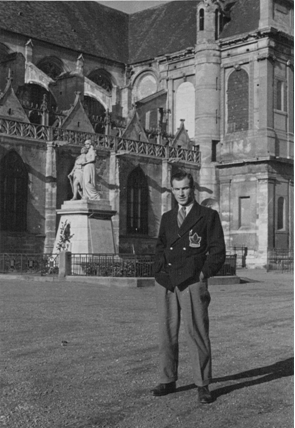

|
When we left Czechoslovakia, a special paper ROXLET was put out in Prague on 27–February–1948 with
a front page cover picture of Sandy holding the World Cup as well as a gift vase that had been presented to us.
At the lower left on the front page the caption read;
"Canadian airmen-hockey players who won the Olympic tournament, visited Czechoslovakia. Here you see the Head of Expedition, Dr. Watson,
holding the hockey World Amateur Cup. On the third page we show a photo and details about all Canadian players."
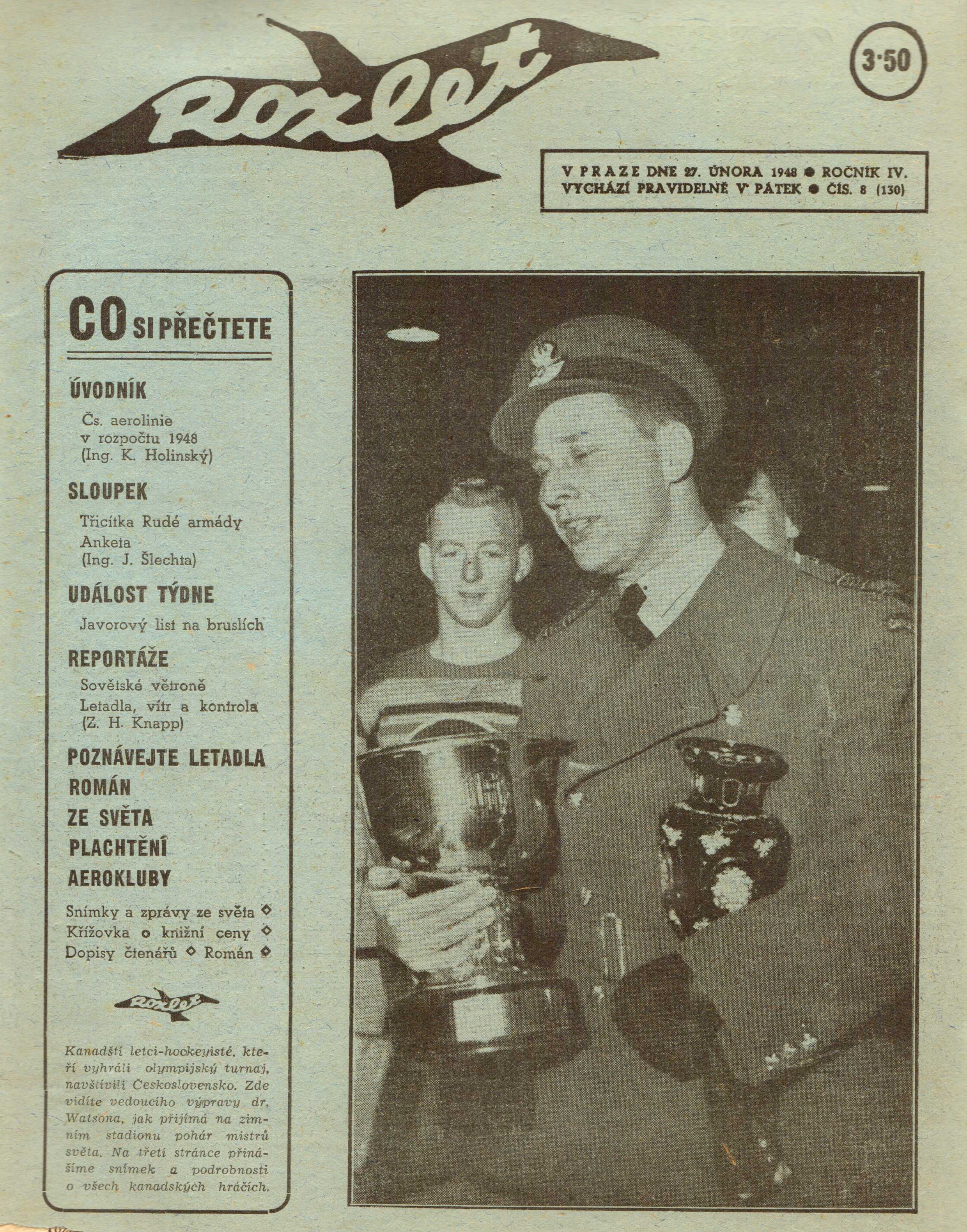
On page 3 (see column to the right) the title of the article was "Maple Leafs On Skates". |
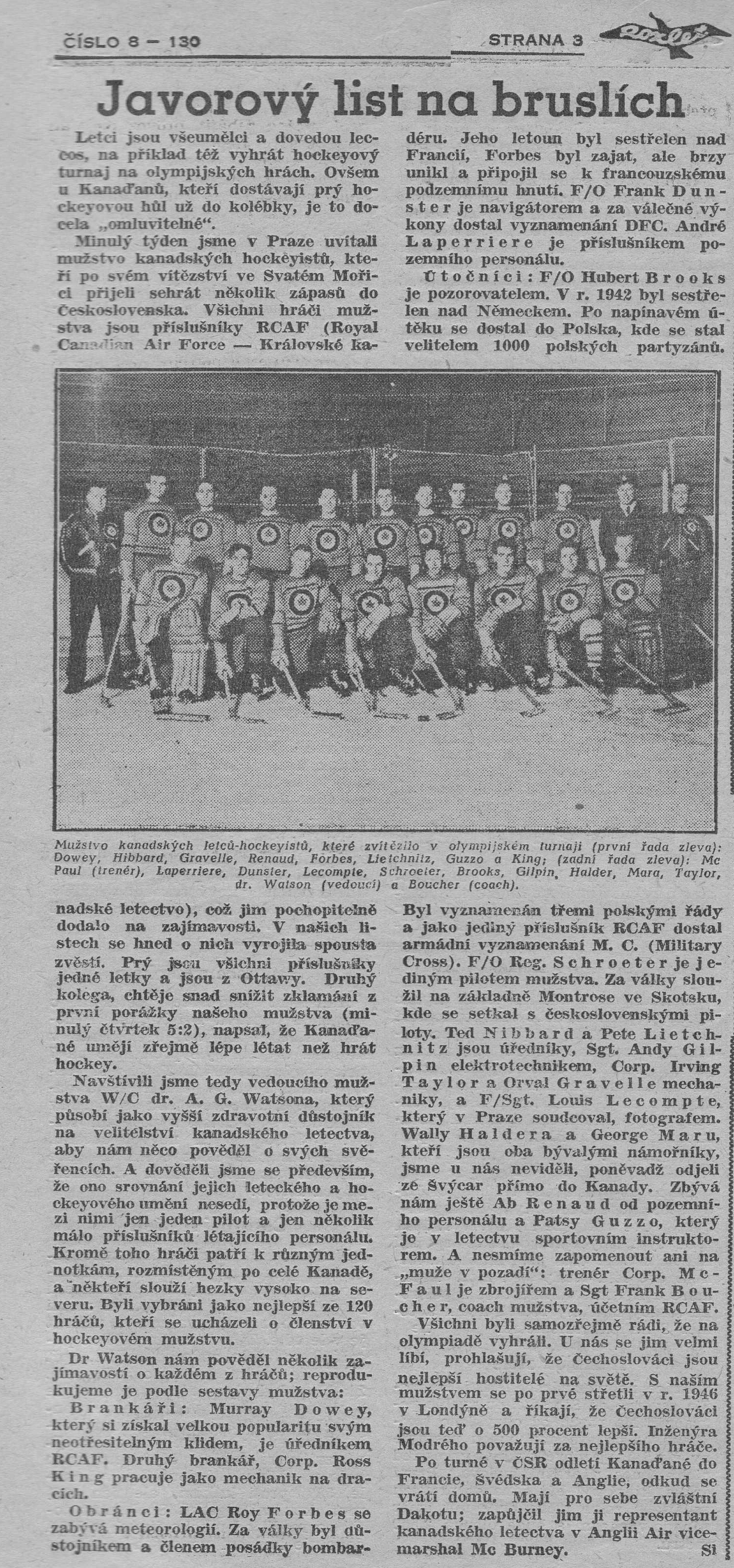
|
RCAF FLYER Newspaper PHOTOS BELOW in Czechoslovakia are courtesy of the Estate of Andy Gilpin.

|
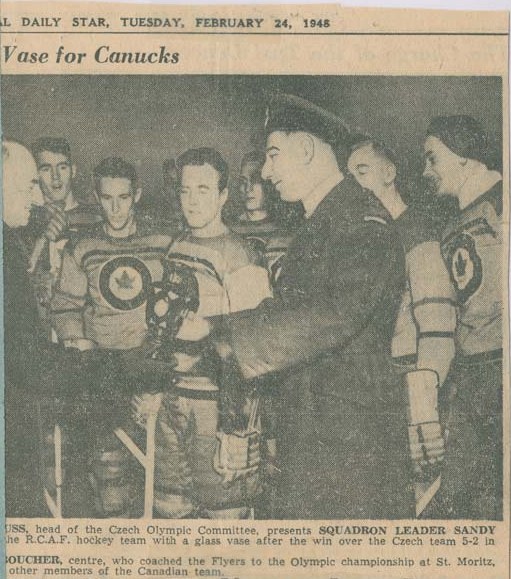
|

| |
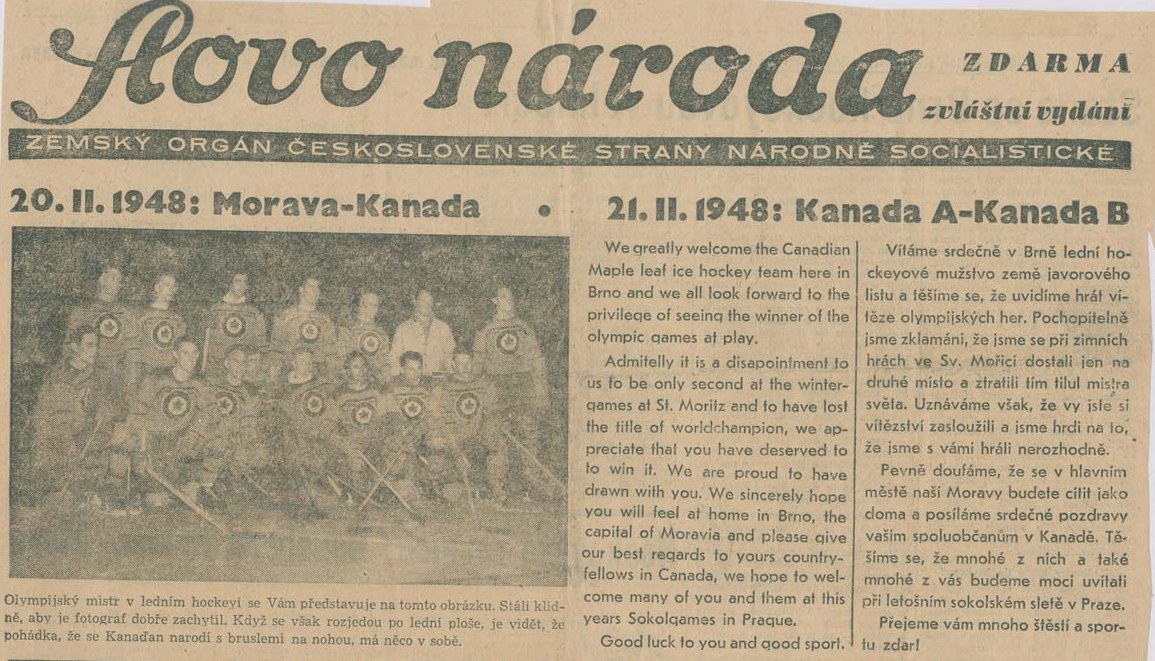
| |

| |

| |
|
|
The team could not have been happier to leave Czechoslovakia when we did on February 27th. Following the communist coup, it seemed the attitude of all of our contacts changed for the worse. The normally always-smiling Leo Dousa who had done so much for us in our travels around the country, was suddenly somber and misty eyed. Before leaving Sandy presented engraved cigarette cases to both Leo and the Czech Hockey Association who had accompanied us on our tour. There was some commotion at the airport and our departure was delayed as our Czech flight crew argued for visas to France, but we eventually got off and arrived in Paris just after 2PM.
Arriving in Paris on the 27th of February and we were put up at the Hotel Moderne.
|
|
|
In Paris we
had a three game mini tournament against Czechoslovakia, Scottish All Stars, and the Paris Racing Team.
Barbara Ann Scott also met up with us in Paris and put on a figure skating exhibition at half time during one of the games.
For further details on a specific game, please double click on the hyper link found in the Summary Flyer Game List at the top of this page and a relevant news article on the game will appear in a new window.

|
Coupe Jean Potin (from 4 to 6 March 1948 in Paris)
Final Rankings: "The Racing Club de Paris, which has in its ranks several Canadian professional players managed to win the Coupe Jean Potin against the Canadian Olympic team champions." |
We beat Czechoslovakia on the 28th and lost 1–2 to the Scottish All Stars on March 3rd.
Murray Dowey left us after the Scottish All Star game – heading home the morning of March 4th to Canada as he had commited to his Toronto based hockey team the Barker's Biscuits that he'd be gone no more than 2 months. Murray was also concerned about not compromising his job at the Toronto Transit Commission.
From there on, Ross King played in nets every night and won the very next game for us 5–3 against
the top ranked Paris Racing Club – loosing a few teeth in the process!
Despite the Flyers beating the Paris Racing Club in our final round robin game on March 6th, the Paris Racing Club ended up winning the overall Coupe Jean Potin Tournament with the best overall goals record of 16 whereas the Flyers had a total of 14 goals (both teams had two victories and one loss in the tournament).
We were all given a small souvenir cup commemorating the tournament (see photo at right).
In Paris, we were served horsemeat one night, at a Parisian restaurant. Immediately after, seeing several hairy horses
on Paris streets, Red Gravelle commented:
"I don't mind eating horse meat if the horses are well groomed but I'm a vegetarian for the rest of the trip."
Then Ambassador Georges Vanier invited us for dinner reception on March 4th. Both he and Madame Vanier seemed to be genuinely pleased to host us, and they both – along with the children attended the game against the Paris Racing Club. The team left the ambassador's residence with a case of duty free Seagram's whisky!

|
Next was Holland. The Dutch sent a special aircraft for us and we landed at Schiphol Airport about 5PM. We were taken to the Hotel Rauch - having a view of the North Sea.
The photo below is of The Hague (Holland) Hockey Rink where we played on March 7th.
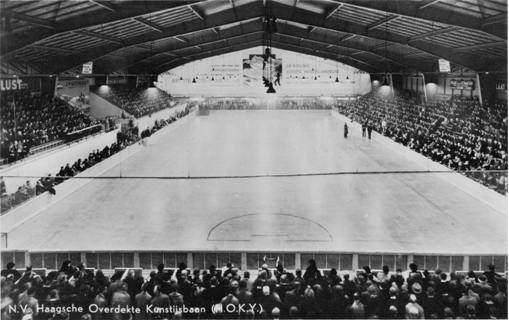
This was a special event for us. The Dutch Royal Family had extended an invitation to play in the Dutch capital
of The Hague. Game time was 8PM on March 7th with the Royals in the stands.
Forbes, Gilpin, Taylor and I were "loaned out" to the Dutch team and the Flyers still won handily by a score of 9–1. We had
a lot of fun that night.

|
For further details on the game, please double click on the hyper link found in the Summary Flyer Game List at the top of this page and a relevant news article on the game will appear in a new window.
The following morning of the 8th we had a brief reception in our honour at the Canadian Embassy.
The trip to Stockholm Sweden turned out to be far more complicated and tiring then planned. We left Schiphol Airport about 2PM and were about an hour away from Stockholm and were diverted to Copenhagen Denmark because of a low cloud ceiling that made it challenging for our Dakotta to land. We then took a bus from Copenhagen to a ferry which brought us across the Orsund to Malmo Sweden. We then made the 300+ mile train ride from Malmo to Stockholm around 9AM the next dat March 9th and then brought by taxi to the Aston Hotel.
The one memory
that both I and the rest of the Flyers always recalled from the Swedish leg of our tour was the food. Finally there was plentiful meats, eggs, ham,
milk etc. We won three of our four games in Sweden and tied the fourth 5–5 against the Scottish Dundee Tigers. As we were leaving
Sweden one diplomat commented in the paper that Canada didn't need to send trained diplomats to improve relations;
"Just send back the R.C.A.F. hockey team!"
|
|
|

|

|
|
For further details on a specific game in Sweden, please double click on the hyper link found in the Summary Flyer Game List at the top of this page and a relevant news article on the game will appear in a new window.

|
|
Our final stop before heading back to Canada was games in Great Britain and Scotland.
We landed at Northolt, England around 7PM on March 17th and were taken by bus to the Crofton Hotel.
I would only stay with the team for the games in Great Britain the 17th to the 20th and not travel to Scotland because I had to stay in London with my new wife Bea and arrange for a visa etc back to Canada. Sandy was very accommodating in this regard. Frank Dunster would take over my adjutant duties in Scotland.
We lost our first game in England to the Wembley All Stars on March 18th. They were good and we were getting tired from our tour. Louis Lecompte obtained a fractured cheekbone and Ross King lost 2 teeth and required 6 stitches in his lip in the exhibition game with Wembley All-Stars. This was Ross King's first loss since he took over the goaltending job. We were starting to get anxious to go home.
Injuries because of our grueling schedule were starting to hurt the team. Some players now had to play almost the whole game. We won five of the next seven games, tied one and lost 5–6 to the last place team in the Scottish league the Fife Flyers on March 27th. Our last game in Europe on March 29th against the Falkirk Lions ended in a 8–3 victory.
For further details on a specific game, please double click on the hyper link found in the Summary Flyer Game List at the top of this page and a relevant news article on the game will appear in a new window.
|
|
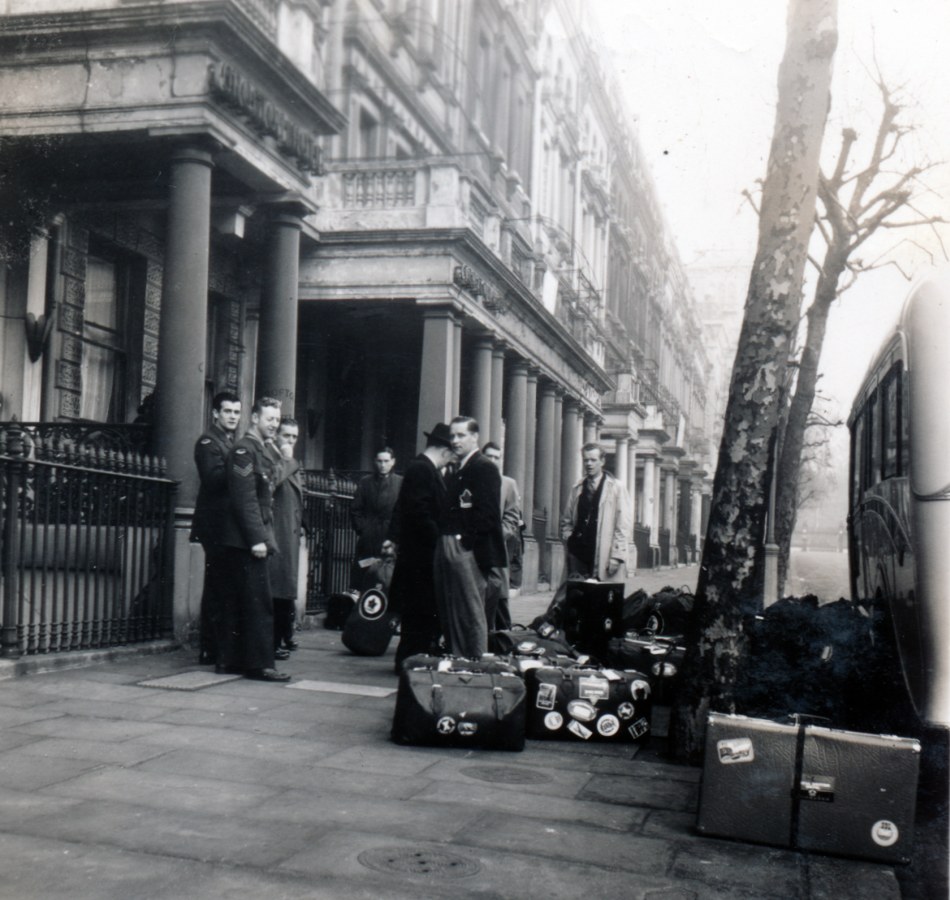
|
We were ready to go home!
We were all tired.
Almost all of us had lost weight - some as much as 10lbs.
A number of our boys were bruised and banged up:
Someone worked out that we had played before approximately 350,000 fans, travelled 15,000 miles through seven countries, played 44 games in 74 days, witnessed the Czech coup d'état, had by and large sub–standard meals and hotels.
Our final record overseas was 31 wins, 5 setbacks (when you are Olympic champions you suffer a "setback" not a "loss") and 6 ties. Two of the games were R.C.A.F. Flyer "red vs blue" internal games.
************************************************************************************
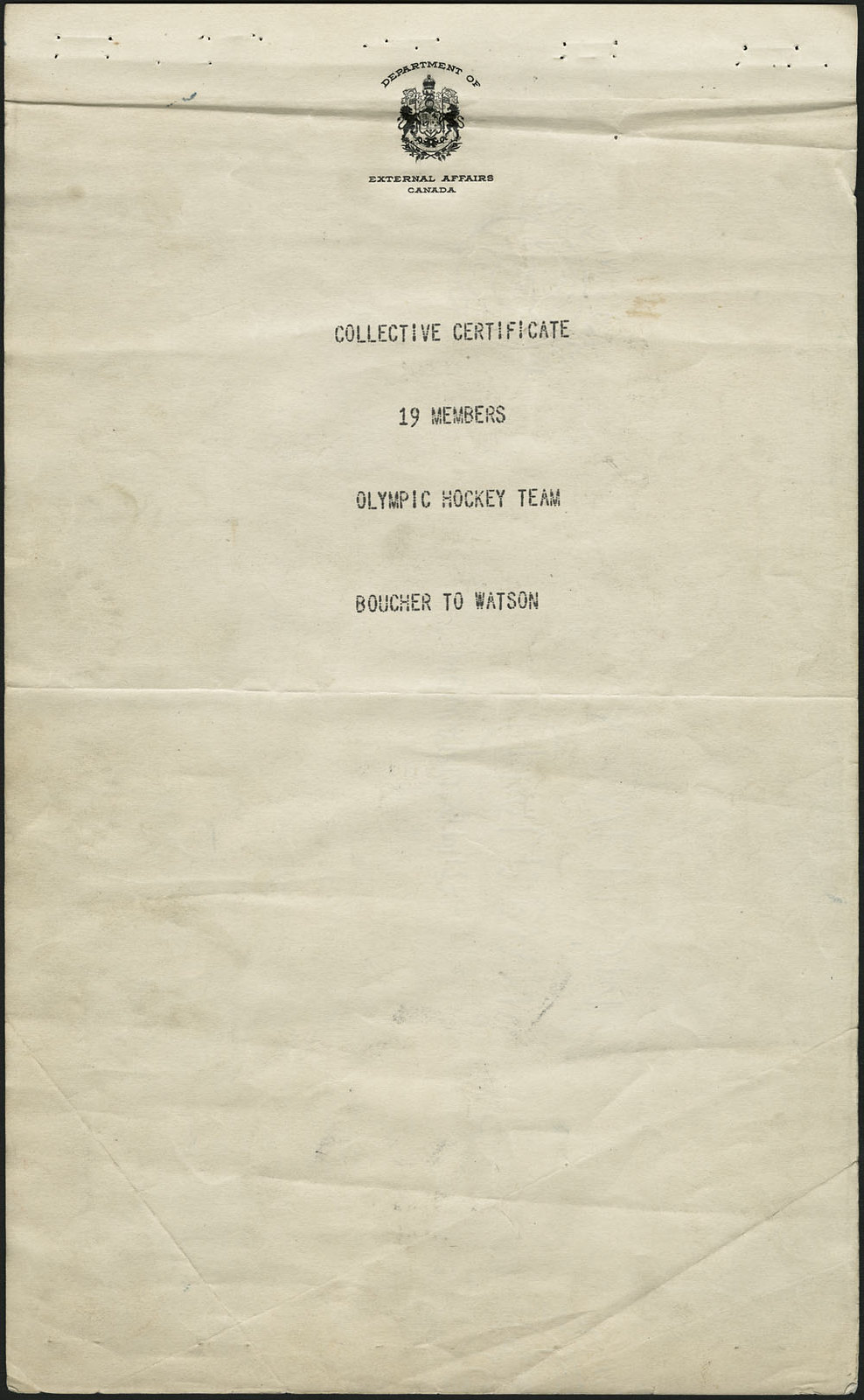 | 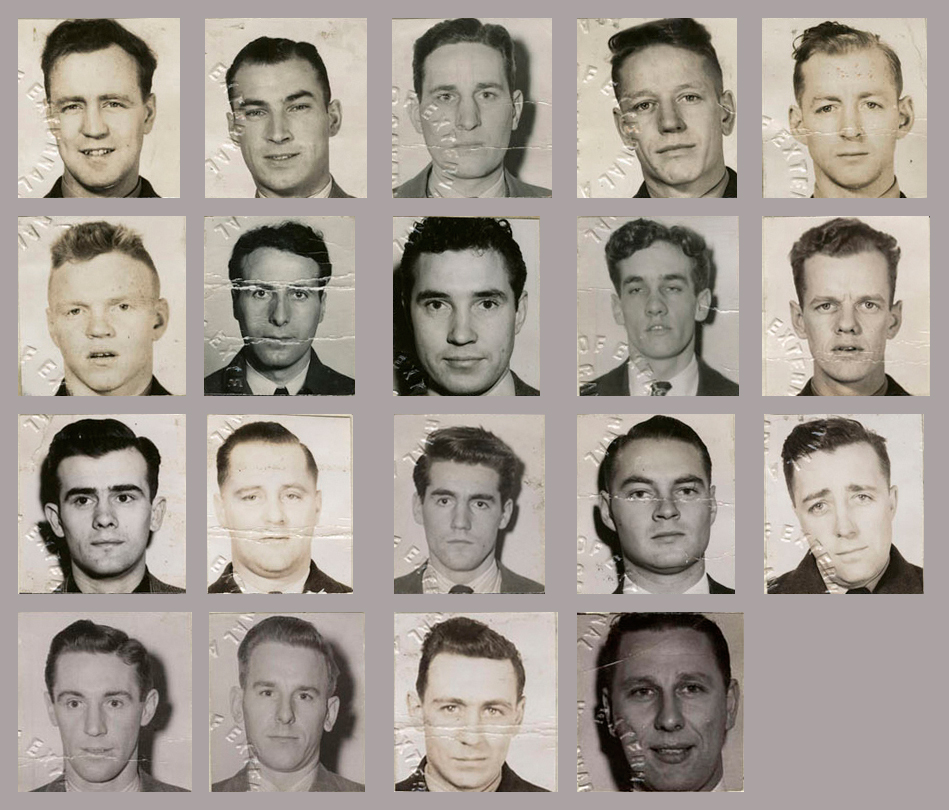 |
 |  |
 |  |
 | 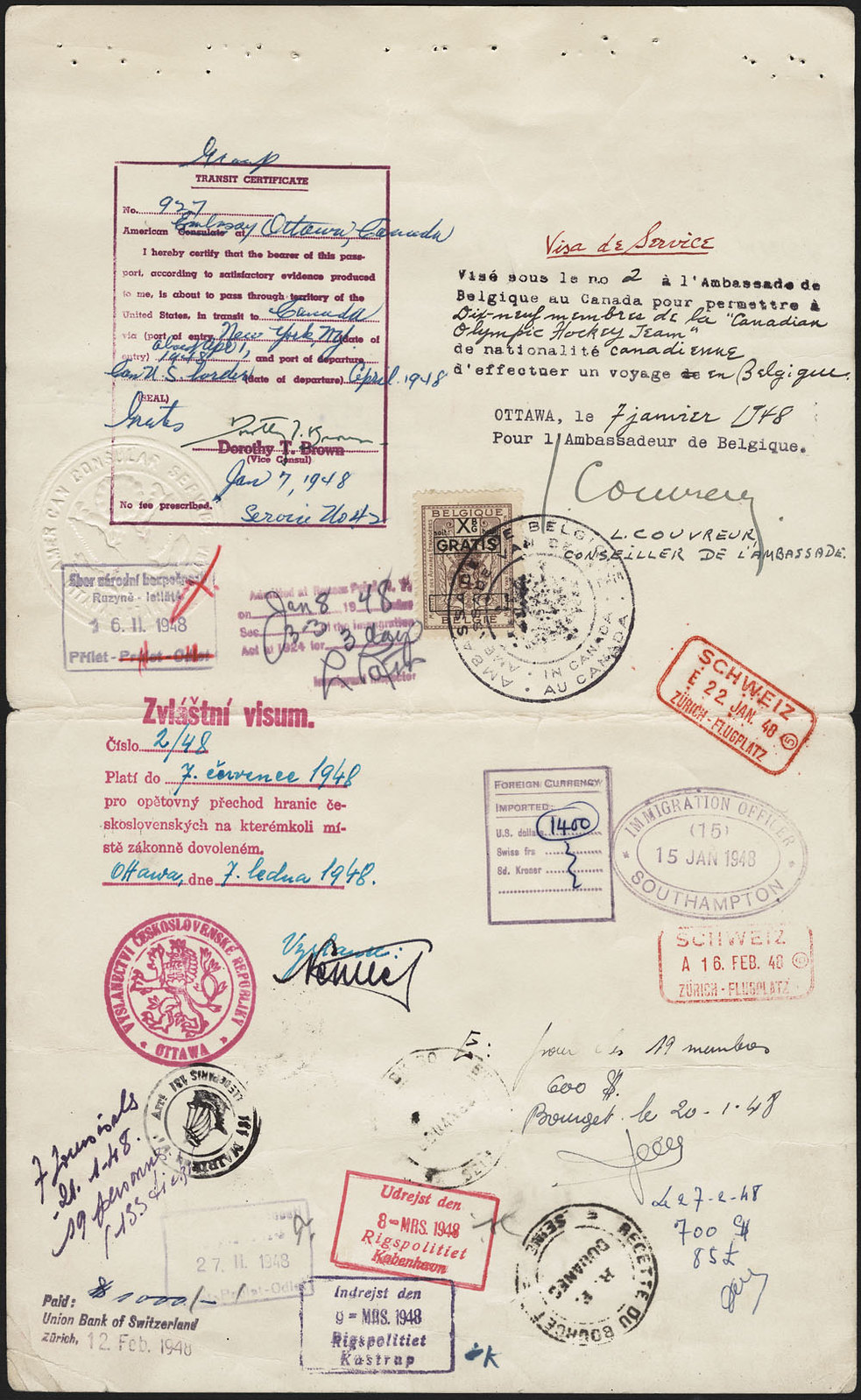 |
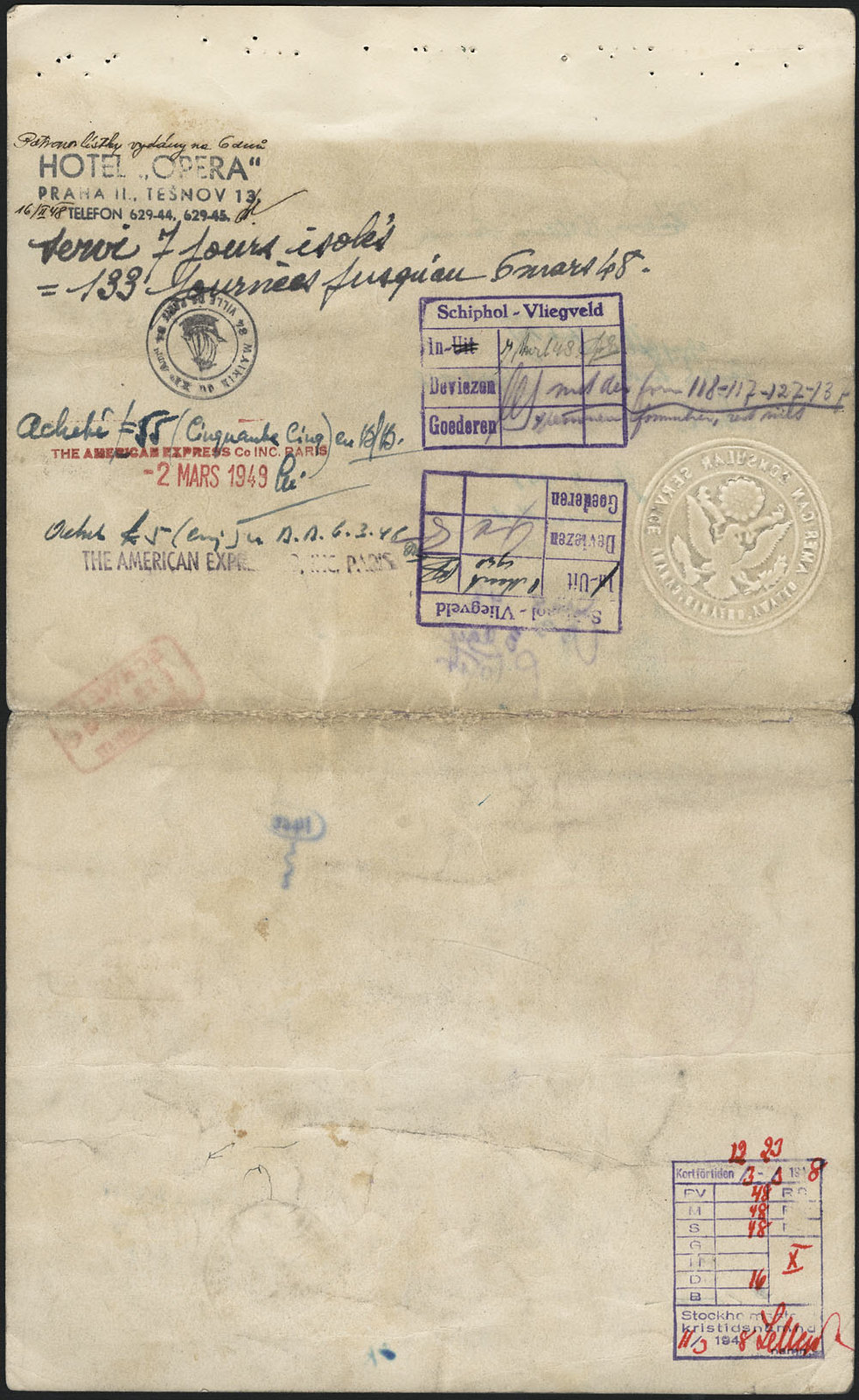 |
| PREVIOUS PAGE | GO TO TOP OF PAGE FOR INTER- and INTRA- CHAPTER NAVIGATION MENUS |
NEXT PAGE |
The Life and Times of Hubert Brooks M.C. C.D.